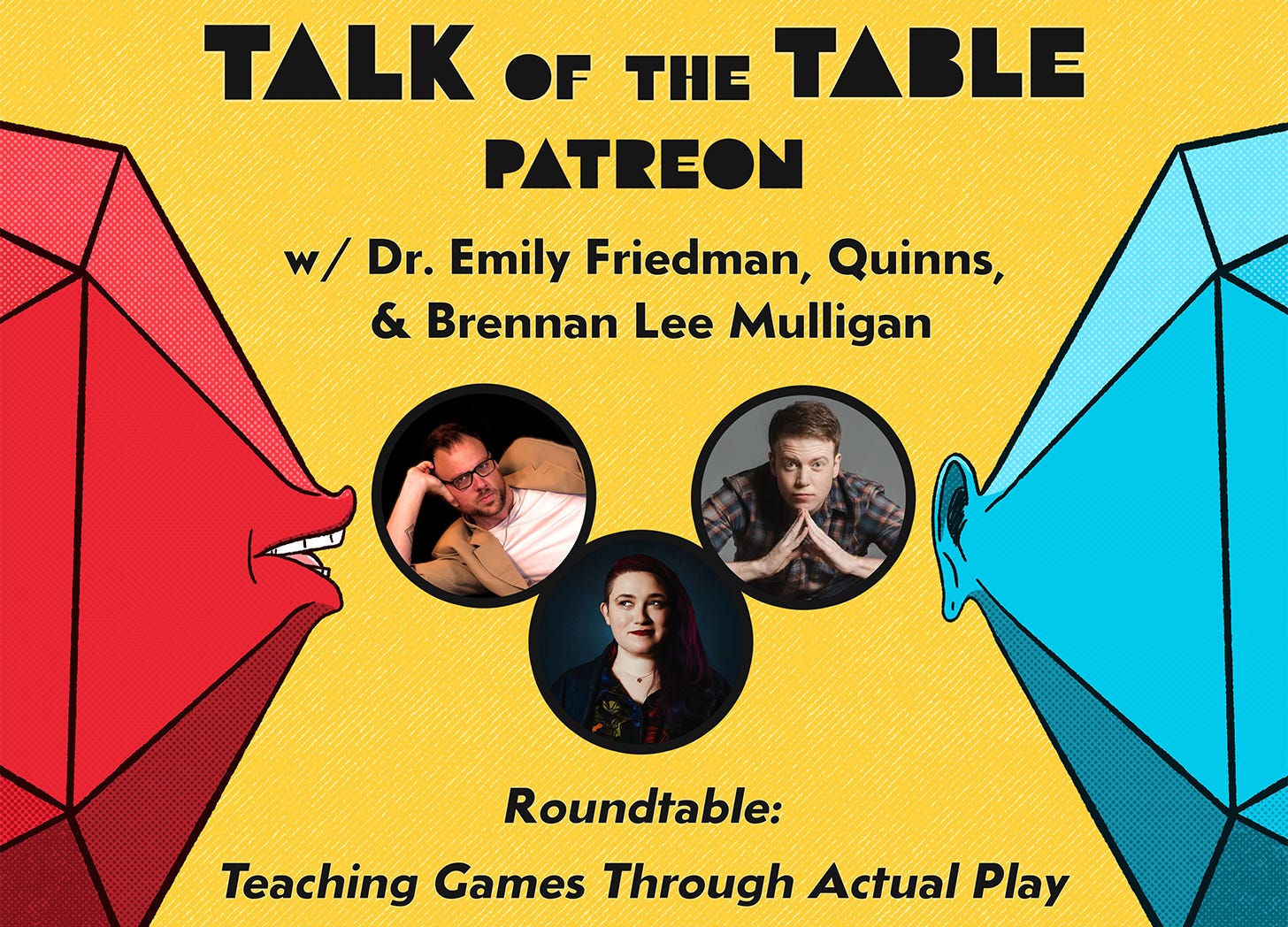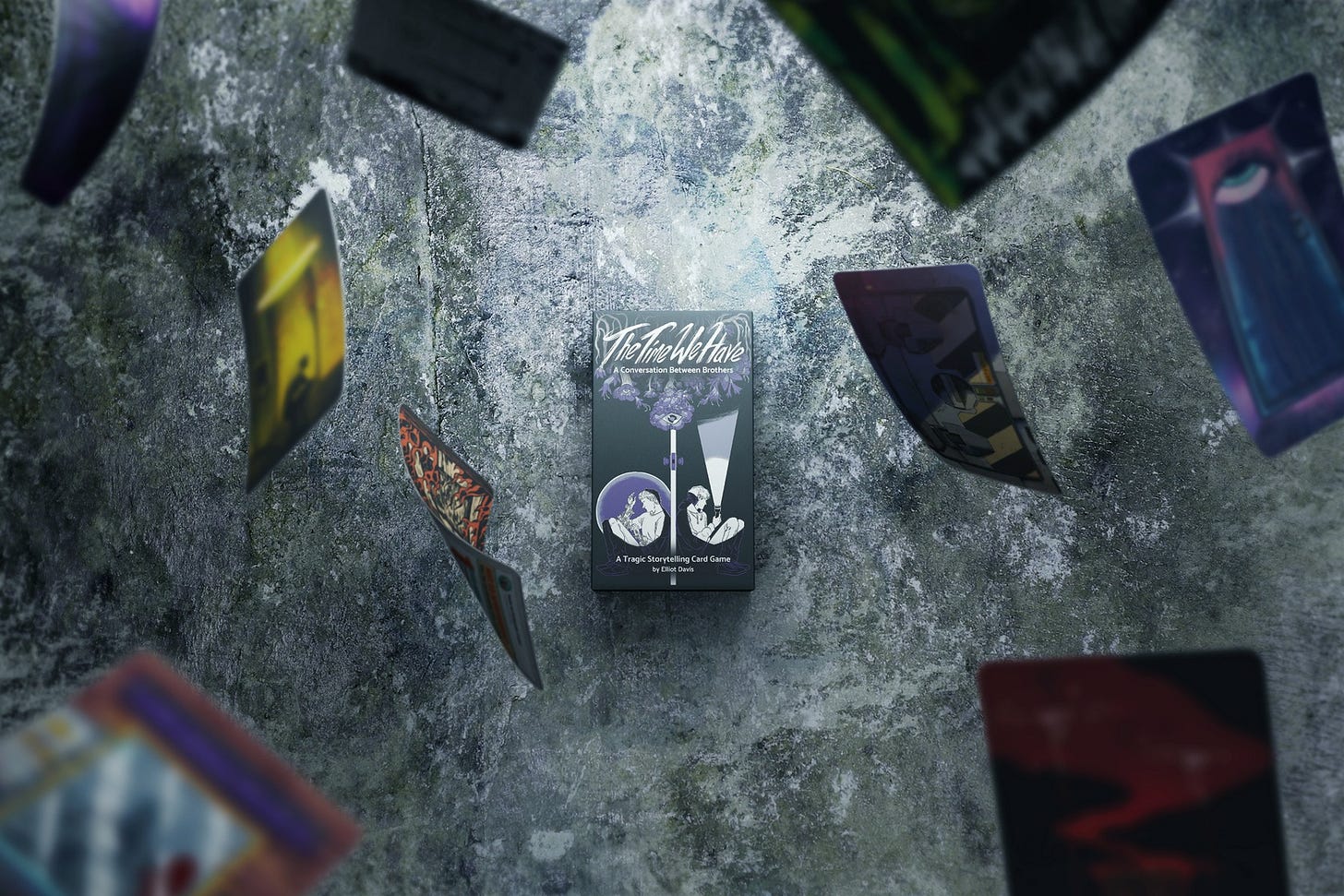A New Roundtable from Talk of the Table!
with Brennan Lee Mulligan, Quinns, and Dr. Emily Friedman
Brian and Elliot are back with a new special edition Talk of the Table Roundtable! This time they’re discussing pedagogic actual play, or how to use AP to teach games, with Dr. Emily Friedman, Quinns, and Brennan Lee Mulligan. Over the course of this two-hour interview, Brian, Elliot, and their panel of experts dig into whether or not actual play is the best tool for teaching games, how we understand skill and learning in TTRPGs and beyond, and who our imagined student is when thinking of actual play as a teaching tool.
The first hour (yes, a full 60 minutes) is out now for free wherever you get your podcasts. And you can access the rest over on the Many Sided Media Patreon! To give you a little taste of what our Roundtable crew has to say, here’s an excerpt from this very special Talk of the Table:
This excerpt has been edited for clarity.
Em: We’ve got this gap where we tell everyone it’s really easy to play [RPGs], anybody can play, you can have fun with your friends tonight. That is true. You will not have the same kind of fun that highly skilled people who’ve been playing for a long time, either one game, many games, or together as a group will have. And I think the challenge that we’re facing is how do we articulate that without feeling like it’s gatekeeping and shutting the door in the face of everybody who’s kind of coming in?
Quinns: I have a feeling on this. I think there is a degree to which the thought leaders in the TTRPG space—of which I think I’m too new to be responsible for this—but where there’s a narrative that we haven’t produced yet that I think people would want to grab onto if it existed. Which is that people now see, thanks to these fantastic outlets of actual play, people playing D&D who are very, very talented. And yet the whole community, myself included when I was writing about TTRPGs at Shut Up & Sit Down, it’s like, no, no, no, you don’t have to be good. Know that while GMing, you’re gonna suck and that’s fine. And all of this is true, but we just say, try it. You’ll get better or it’s easy. And we all desperately want it to be true. Because it is at least partially true that GMing is great fun to do badly and you just gotta try it, and don’t try and be like other GMs. The thing we’ve failed to do is kind of provide an outlet for people who want to be really fucking good, who want to be Brennan, right?
Em: Yes!
Quinns: Like, in the same way that, if you think about home cooks, like so many people, myself included, get into cooking because they want to even though they know it’s hard. And they want to get better, and they want to climb that Mount Everest of eventually being a truly fantastic home cook. And yeah, sure, there’s endless resources on how to become a better DM, right? There are endless tips, endless tricks. Brennan has done how many episodes of Adventuring Academy, you know? But we have that resource because there’s demand for it, but we don’t have the narrative of, okay, so you want to be a GM, you are going to go on a journey and it’s going to be hard. And I’m wary even saying this because I think that’s a very masculine kind of notion—it’s going to be tough, but if you’re a bad enough dude, then you’re going to make it. And I think that is to some, maybe the worst possible thing we could be saying. But at the same time, if we have this dissonance, which I think is confusing for people, it’s letting people kind of disagree with what they see, or... Yeah. That’s where I’m at.
What’s the longest campaign you’ve been involved in?
Brennan: Man, I agree with that so much. I’m rocketing back to improv, because I don’t think that this is a phenomenon that’s unique to actual play, but I think that sometimes these voices come about as a hobby expands or is enjoying a cultural moment. Cultures of “I have fears about my ability to perform in a thing I deeply care about” are not unique to tabletop role-playing games. Every actor and chef and engineer, and everything in the world is thinking, “what if I’m not good at a thing I care about,” right? There’s nowhere you can go that you won’t find some version of that.
But I think to Quinns’ point, if you want talk about what the best pedagogical tool is, bar none, for TTRPG and learning to play—and I know that this is may be controversial, I think I stand by this, I’ve said it enough that I hope I would stand by it—is that you will learn more from running one 4-hour session for your friends and stumbling through it than you will in watching every episode of Adventuring Academy. Like the gems of wisdom in Matt Colville’s Running the Game series, you won’t have the muscle memory to plug that materia into. You won’t have the nodes, like you literally don’t have the nodes to understand how smart what Colville is saying is until you have done enough of it to be like, “that plugs into that weird gap in my knowledge,” right?
Quinns: Yes.
Elliot: Yes.
Brennan: I got to a point as an improv teacher where I think I had done the pat answer that Quinns’ is referring to too many times and saw it not work. Like people would come up before an Improv 101 show and you would see real nerves. They would go, “What if our class show is bad? Talk to me about connections again. Talk to me about second beats again. What if I’m not good? What if I’m bad at this? I don’t wanna be bad at this. I’m gonna go on stage. This is really nerve wracking.” And you would say some version of, “you’re gonna be great.” First of all, first of all, no, you’re not. And that’s so mean to say that.
Quinns: Hahaha
Brian: Hahaha
Brennan: Second of all, if you are great or you’re not great, so what? I started to tell people: this is your 101 class show. If you remain an improviser and that becomes a core part of your identity, you should know that I’d been doing this for about six or seven years at that point. I don’t remember anything that happened in my 101 class show. I don’t remember where it physically was, right? Like, couldn’t tell you. And if you’re not defining yourself as an improviser, then this is all a fucking lark. And what do you care if it goes bad? Either way, you should not put weight on this.
I had a student one time come up and I guess I was sleep deprived or was just in a weird place. And the student had asked me for a pep talk a couple times and it just reached the edge of my patience because I had started to perceive behind the question a kind of needling sense of “I’d like to be as good at this as people who humiliated themselves without humiliating myself.” I went and I just asked them a straightforward question and I said, “why do you deserve to be great at this right away?”
Quinns: Hahaha!
Brennan: When every one of these people on stage that you idolize shocked and humiliated themselves multiple times in front of groups of strangers to claw their way desperately to something resembling proficiency, but you and you alone must have a flawless record of only having succeeded at this? I think that there is a part of that really sweet desire to be good that is a little bit toxic and must be disabused.
The Time We Have is Out NOW!
The long awaited arrival of The Time We Have has finally come! Yes, Elliot Davis’s latest game is officially available to purchase and play right this very moment.
The Time We Have is a tragic two-player zombie roleplaying game played on opposite sides of a closed door. A game about what it means to be a brother, about all the complexity, vulnerability, and joy that comes with it. This is a storytelling card game played on opposite sides of a closed door and a conversation about saying goodbye.
If you want to get a sense of the game before you play there are multiple APs to check out, all compiled into this handy playlist from Superdillin. Or for a super-quick introduction, be sure to listen to this audio trailer from the OG crowdfunding campaign.
Pick up a physical copy, a digital copy or a special-edition deluxe version over at morebluberries.shop.
🗞️ News Worthy
My First Dungeon earned two nominations, Best Audio Actual Play and Best GameMaster/Player Actual Play (Elliot Davis), at the Rio Webfest!
Planet Arcana releases teaser trailer for their upcoming season featuring Shenuque Tissera.
Gamefound is launching a new crowdfunding event, The RPG Party, aimed at highlighting and supporting emerging tabletop RPG creators in collaboration with their partners Magpie Games, Loot Tavern, Chaosium, and DrivethruRPG. They reviewed over 200 submissions from across the community and selected over 20 projects, including The Wildsea: Tigers on the Wire and Ambition, to help bring to life with your support.
🎲 What We’re Bringing to The Table
🎥 Watch: Tales From Woodcreek “Session Zero” Ft. Deborah Ann Woll, Ginny Di, and Anjali Bhimani
📚 Read: Tabletop Journalist And Advocate Rob Wieland Has Passed Away
🎧 Listen: Dice Exploder Actual Play: An Uncomfortable Offer with Maia Wilson
News From The Many Sided Network
Played in Kobold Press’ Tales of the Valiant system and featuring lore and characters from their Labyrinth Worldbook, Thank God It’s Doomsday combines high fantasy worldbuilding with mockumentary-style storytelling in a workplace comedy about the end of everything. This new series (debuting today!) from Mage Hand High Five is GMed by Max Weinberg, and includes special guests Robin Ekberg (Dorkspawn, Frequencies) and Shenuque Tissera (Many Sided Media) alongside Mage Hand High Five’s Casey Papas and Rowan McStay.







